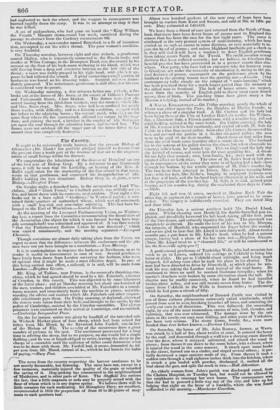COuntrn.
It ought to be universally made known, that the present Bishop of Gloucester (Dr. Monk) has publicly pledged himself to devote from the present time a tenth part of the revenue of that see to the augmen- tation of small livings within his diocese.
We congratulate the inhabitants of the diocese of Hereford on one of the first acts of Bishop Grey. By a reference to our Monmouth news, it will be seen that his Lordship, on hearing of the Rev. J. Bull's application for the mastership of the free school in that town, wrote to that gentleman, and expressed his disapprobation of Mr. Bull's holding the two situations. Bishop Grey is, de fitcto, a new Bishop.-a-Hereford Times.
On Sunday night, a detached barn, in the occupation of Lord Win- chilsea, ailed " Black Fostel," in Challock parish, was wilfully set on fire, and burnt down with its contents, seed sainfoin. Next night a fire broke out in a barn called " Godfreys," in Westwell parish; it con- tained thirty quarters of unthrasbed wheat, which was all consumed, with a small hay-rick and cow-lodge adjoining. This last barn be- longed to the Earl of Winchilsea.—Kentish Gazette.
At the meeting of the Liverpool Parliamentary Union, on Wednes- day last, a report from the Committee recommending the dissolution of the Association (the object for which it was formed having been hap- pily accomplished) was submitted and approved of. It was then moved " that the Parliamentary Reform Union be now dissolved ;" which was carried unanimously, and the meeting separated.—Liverpool Chronicle.
Though secessions are almost daily taking place from the Union, we regret to state that the differences between the coalowners and the pit- men have not yet been brought to a conclusion.—Tyne Mercury.
It is in contemplation to improve the harbour at Newhaven, so as to reader it useful to Government in case of war. Several gentlemen have lately been down from London surveying the harbour, who were of opinion that it might be made a most effective depot. In case of this being carried into effect, a railroad, it is said, will be made from London.—Brighton Gazette.
Mr. King, of Tadlow, near Foam], is the owner.of a thrashing-ma- chine, which he had agreed should be used by a Mr. Faircloth, a farmer of Croydon, in this county. This was objected to by some labourers of the latter place ; and on Monday morning last about one hundred of the men, women, and children assembled at Mr. Faireloth's in a tumid- tuous manner, and immediately broke the machine to pieces, notwith- standing the advice and caution which Mr. Faircloth and other respect- able inhabitants gave them.. On Friday morning, at daybreak, eleven of the rioters were taken from their beds, and brought to the castle, by the police of Cainbridge, assisted by the Croydon constables. The eleven prisoners were examined on their arrival at Cambridge, and committed. .—Cambridge Independent Press.
On the 1st instant, notice was given by handbill of the intended sale in Wisbech Market-place of four sheep, which- had been seized for tithes from Mr. Bland, by the Reverend John Fardell, son-in-law of the Bishop of Ely. The novelty of the occurrence drew a great number of persons to the spot. The auctioneer persevered for a long time in offering the sheep, but to no purpose, no one would bid a single farthing; and he was at length obliged to retire, leaving the sheep in the charge of a constable until the collector of tithes could determine what was to be done with them. Mr. Fardell bad, it seems, demanded 5s. 6d. per acre from Mr. Bland, instead of 4s., which he had beenin the habit of paying.—Bury Post.


























 Previous page
Previous page